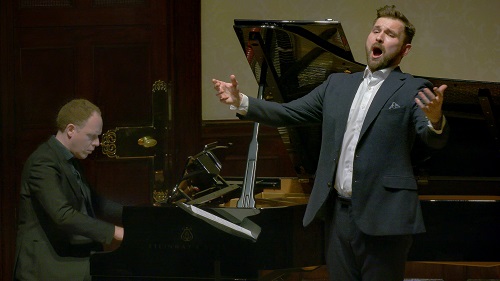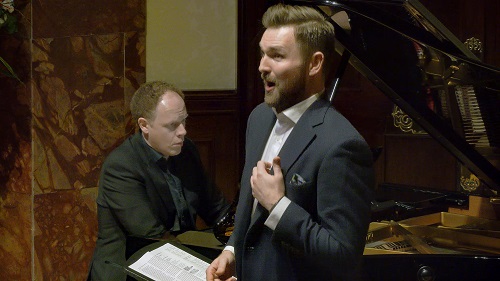Titled Songs of Antiquity, this recital by baritone James Newby and pianist Joseph Middleton began and ended both in the past and in darkness, the Prologue and Epilogue composed by Oliver Muxworthy to bookend his new arrangements of Dowland’s ‘Flow my Tears’ and ‘In darkness let me dwell’ cascading quietly through a dimly lit Wigmore Hall.
Muxworthy, a composer and jazz pianist, has tinkered with Dowland’s lute accompaniments, transforming them into fragmented piano splutters which are presumably improvisatory musings on the vocal line, and which even the discerning and delicate touch of Joseph Middleton couldn’t make convincing. One can in fact imagine Dowland in a shadowy jazz club, extemporising freely and ecstatically. But, his lute ayres are taut constructions designed to communicate in a very particular cultural and political environment: he knew the formula and worked it with infinite variation and to perfection. In Muxworthy’s arrangement, the piano’s affected stuttering disrupts the melodic phrasing, just as the re-harmonisations destroy the integration of textual and musical meaning. ‘In darkness’ felt particularly uncomfortable, swelling to grandiose proportions in contradiction of the images of intimacy and retreat – from light and life – that characterise the text.
James Newby sang Muxworthy’s arrangements in sombre fashion, the texts – with their rhetorical triplets of “tears and sighs and groans”, “fear and grief and pain”, and imagery of graves, tombs and hell (where the “happy … feel not the world’s despite”) – setting a tone of gloomy anguish which largely prevailed throughout the recital. But, songs by Schubert, Schumann, Wolf and Liszt, gave Newby the opportunity to inhabit the role of story-teller which he seems to find so natural, and for the audience to enjoy his even, smooth baritone which is richly communicative.
Perhaps not surprisingly, the Hanover-based baritone’s German diction was superb – the words fairly leapt from the page (or would have done had Newby not been performing from memory). Indeed, at times the songs became mini-operatic dramas: Newby is an expressive performer, face animated, situations conveyed through gesture and movement as much as through the voice. Interestingly, when Newby won the Kathleen Ferrier Award in 2016 (a joint First Prize winner alongside Alessandro Fisher), I wrote that his performance suggested he would develop a ‘dramatic presence to match his appealing vocal tone’.

So, Newby created vivid worlds in his sequence of three Schubert songs. The melodrama of ‘Gruppe aus dem Tartarus’ (Scene from Hades) was conveyed through rhythmic tautness, dynamic projection and vocal power. Middleton’s even, repeating piano chords at the start of ‘Strophe aus Die Götter Griechenlands’ (verse from ‘the gods of Greece’) established a more delicate mood, and Newby’s lovely head voice brought lightness and a touch of wistfulness to the song’s opening question and appeal: “Schöne Welt, wo bist du? Kehre wieder/ Holdes Blütenalter der Natur!” (Beautiful world, where are you? Come again, fair springtime of nature). The alternations of major and minor mode were expressive, most particularly at the close with the return of the questioning tone, Middleton’s lucidity combining with Newby’s sweet pianissimo to beautiful effect. ‘Ganymed’ had the requisite charm and playfulness as the duo built an engaging narrative, while in the brief ‘Fahrt zum Hades’ (Journey to Hades) there was an apt ruggedness.
Schumann’s ‘Belsatzar’, which sets Heine’s treatment of the biblical King Nebuchadnezzar, was a terrifically vivid ballad, vigorous and oratorical, the suspense and foreboding accumulating towards the resounding climax. By contrast, Hugo Wolf’s ‘Auf ein altes Bild’ (On an old painting) had a warm fluency, as voice and piano interweaved, that created a mood of gentle reflection. Eduard Mörike’s poem imagines a painting in which the Christ child is depicted playing in his mother’s lap in a summer meadow, while in the woods behind them grows the tree from which the Cross will be formed. There is a sort of ‘double-imagining’ as Wolf’s music creates a frame for the envisioned picture, and Newby and Middleton evoked an appropriately poignant mood, the modality creating a timeless air, and the final line, more dissonant, bringing a touch of foreboding to the reflections: “Ach, grünet schon des Kreuzes Stamm” (The Cross is already, alas, in leaf!).
Liszt’s 3 sonetti di Petrarca demand much of both singer and pianist. Newby and Middleton left one in no doubt of their technical credentials but also impressed with their imaginative engagement with the sophisticated paradoxes and antitheses of Petrarch’s sonnets. Newby maintained a lovely legato line throughout, the lyricism of ‘Pace non trovo’ (I find no peace) contrasting with the harmonic agitation that Middleton exploited to fine effect, and with the sequence’s more operatic vocal rhetoric. The baritone again used his sotto voce head voice tellingly – especially at the close of ‘Benedetto sia’l giorno’ (Blessed be the day), where the chromatic roving comes to an ambiguous ‘rest’, as the poet-speaker reflects on his work, which has been inspired by and promulgated his love for Laura and her essence. The grandeur of ‘I’ vidi in terra angelici costumi’ (I beheld on earth angelic grace) and the striking harmonic restless were quelled at the close by the reverence of a heaven made harmonious by Laura’s beauty.

At the centre of the programme was a new song-cycle by Brian Elias, I saw a peacock, which was written for Newby and commissioned by Wigmore Hall. Elias has set six eclectic texts, not all of equal poetic merit, but all bursting with vivid images which invite musical representation. The eponymous nonsense poem (included by Quentin Blake in his Puffin Book of Nonsense Verse) opens the cycle, with an onomatopoeic clamour worthy of the bird’s strident ‘kraa’ call that signals distress or danger. Flamboyance and restlessness characterise the piano part, while the vocal line strikes a declamatory note, the busyness subsiding towards the close, the voice momentarily unaccompanied. Elias doesn’t seem to have taken musical advantage of the poem’s witty structure, though: my guest for the evening pointed out that the 400-year-old anonymous text is an example of what is known as a ‘trick’ poem with the second part of each line looking both backwards and forwards.
Elias’s setting of the short anonymous lyric, ‘Were the bright day’, flowers gradually, and Newby controlled the stillness of the vocal line with skill, as Middleton’s slowly ascending curves carefully etched themselves into the aural space, creating a visionary mood to complement the text’s reflections which unite sensuality and transcendence. There were more visions in the setting of William Blake’s ‘The angel’, in which Newby demonstrated that he could project a clear vocal line through the most energetic and shifting accompanying textures.
George Peele’s ‘Bethsabe’ comes from a play Peele based closely on the biblical account of King David’s adultery with the wife of Uriah the Hittite, The Love of King David and Fair Bethsabe. The stage direction reads: ‘He draws a curtaine and discovers Bethsabe with her maid, bathing over a spring. She sings, and David sits above, viewing her.’ Peele’s language is euphonious and seems to invite musical setting, but Elias does not fully exploit the erotic excess and lustre of the language, nor Peele’s clever metrical complexities. The best of Elias’s settings is the final one, Edward Thomas’s ‘Will you come?’, which is both a love song and an invocation to the Muse. Elias’s tense setting captures the strange liminality of the poem, with its short lines, repeated appeal, ‘come’, changing verb tenses and shifts of time. Newby’s sensitivity to these nuances, along with Middleton’s characteristically perceptively interpretation of the piano’s imagery – a low pedal and pianissimo flickering conveying the light of sun and moon and the weight of planetary movements – made the details tell.
One sometimes wonders why performers offer an encore having constructed an exquisitely ‘complete’ programme. But, in this case, Herbert Howell’s ‘King David’, which sets Walter de la Mare, perhaps, despite its inherent sadness, brought some light to the darkness.
Claire Seymour
James Newby (baritone), Joseph Middleton (piano)
Oliver Muxworthy (b.1993) – Prologue (2023, world première); John Dowland (1563-1626) – Flow my tears arr. Muxworthy (world première); Franz Schubert (1797-1828) – Gruppe aus dem Tartarus D583, Strophe aus Die Götter Griechenlands D677, Ganymed D544; Brian Elias (b.1948) – I saw a peacock (2020, world première); Robert Schumann (1810-1856) – Belsatzar Op.57; Hugo Wolf (1860-1903) – Auf ein altes Bild from Mörike Lieder; Schubert – Fahrt zum Hades D526; Franz Liszt (1811-1886) – 3 sonetti di Petrarca S270/1; Dowland – In darkness let me dwell arr. Muxworthy (world première); Muxworthy – Epilogue (2023, world première)
Wigmore Hall, London; Thursday 28th December 2023.
ABOVE: British baritone James Newby performs with pianist Joseph Middleton at London’s Wigmore Hall on Thursday 28 December 2023. © The Wigmore Hall Trust, 2023